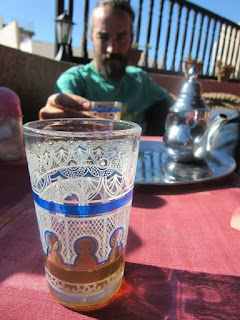Our memories are multi-sensory. The way we experience the world determines what matters to us. What matters to us determines what we remember. Places, faces, smells, sounds, colours, buildings, books and films trigger emotional connections between ideas. If you want to improve your memory of something, you need to create as many links to that thing as possible. Ideally funny, sexy, vivid or controversial. The monks who discovered this were tormented by the naughty tricks they were using in their heads to remember scripture.
Read 'Moonwalking with Einstein' by Joshua Foer
One of our strongest abilities is to close our eyes and visualise places we have been. The idea of 'Memory Palaces' is built around this. Think through some of the places you have lived. Even as a child. Walk around your school in your head. Through repetition, these places have become a pathway or filing system. Memory Palaces place ideas through connections at various points. They forge the connections through links. To go to an idea, you go to the place. It will be there.
I like using this in chipping away at my cultural ignorance. I have been trying to learn more about the Middle East and the cultural struggle going on with Islam. I just spent two weeks in Morocco. Surrounded by 5 daily calls to prayer and staying in the old Medina, it was the kind of place where reading about these issues would stick. I have started reading 'From Babel to Dragomans: Interpreting the Middle East' by Bernard Lewis. It is a collection of essays on a broad range of topics by a Historian who spent his life studying the region and cultures. I first finished off 'Islam: A Short History' by Karen Armstrong. Other books from the last year include 'The Fall of the Ottomans' by Eugene Rogan, and 'A Man of Good Hope' by Jonny Steinberg.
One of the key issues connects quite strongly to some of the raw racial discussions being had in South Africa at the moment. Lewis discusses Group Hate as coming from a detached envy or fear. When we hate an individual, it tends to be because of something. When it becomes a group, it can become more abstract, and often more dangerous and entrenched. When the emotions of envy/fear get involved, defences kick in and we create groups to hate not because of an action, but because of who they are.
History has a habit of destroying prejudice. Look back far enough and you realise how temporary dominance and subjugation are. For most of the time we have had a written record of human history, people with white skin were the Barbarians. Rome was conquered by these Barbarians and sent Europe into a dark age in terms of learning. Learning didn't cease. Some was lost. Some was confined. Europe's dark age was during the Islamic Golden Age. Britain which later came to dominate was so far on the periphery of 'Civilisation' that Rome had given up on it, and the more 'Advanced' societies were far away.
Africa comes partly from the Afri Tribe (Greek word) which lived around Carthage and which subsequently became Islamised as Ifriqiya and the area of Tunisia, Algeria and Libya. The name of the Berber people also derives from Barbarian. All you Black and White people are the same to us Greeks. North Africa was very much a more established part of the Old World of Europe. The tribes of Britain and Southern Africa were far away doing their thing. As was China. The idea of a separate continent of Africa and Asia was a much later European Invention. Long after Carthage and Rome had battled for supremacy. Watching 'The Man in the High Castle' and thinking of alternate histories, there are many ways history can play out.
Fear and envy are powerful emotions that can be worked through. As a source of racism, they can be beaten. The pseudo-science that was used to create ideological racism against Jews and Blacks was a weak attempt to justify creating groups to which Human Rights would not apply. That pseudo-science has fallen, and we know race is not a scientifically valid concept in creating groups. It is a human creation. It is a story. One that has created real division. Most of our challenges now involve creating better stories.
The fights facing us now are clashing cultures. History shows that the best bits of cultures have been a give and take. Learning comes and is spread. There isn't a straight line of progress. There isn't a ladder of superiority for groups. We can enrich ourselves creating more connections. By making more things matter.
By making more things worth remembering.



No comments:
Post a Comment